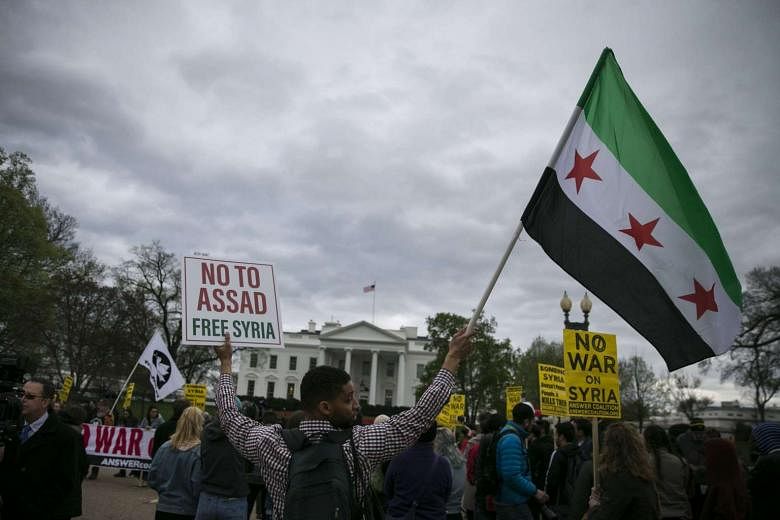WASHINGTON (NYTIMES) - Donald Trump had a blunt warning for his predecessor.
"We should stay the hell out of Syria," he wrote on Twitter in June 2013, after President Barack Obama directed US forces to increase support to Syrian rebels in the wake of a deadly chemical weapons attack by that country's government.
Nearly four years later, now president himself and grappling with how to respond to another chemical weapons attack by the Syrian government, Mr Trump ignored his own warnings and did what Mr Obama threatened but never carried out: order a missile strike targeting assets of President Bashar al-Assad.
To understand the magnitude of Mr Trump's reversal and the history of his public stances on one of the world's bloodiest civil wars, one need look no further than the president's Twitter account.
Mr Trump posted dozens of tweets about the conflict in the years before he declared his candidacy for the White House, and frequently did so during the campaign as well. Channelling the same bluntness that helped fuel his political rise, he carved out a staunchly noninterventionist stance on the conflict and criticised Mr Obama's approach as plodding.
But he also made one thing clear: If he was in charge, any action would be swift and secretive to catch Mr Assad off guard.
We have sifted through Mr Trump's account for the highlights:
2011-12: Syria enters his radar screen
It was several months after it began before the growing conflict in Syria appears to have attracted Mr Trump's attention, and, even then, it was only a blip.
Mr Trump, at the time best known as a reality television personality, first weighed in on Syria in October 2011 to criticise the United Nations for its inaction after China and Russia had successfully blocked sanctions against the Assad government.
Nearly a year later, in summer 2012, Mr Trump wrote again, this time aiming his criticism squarely at Mr Obama for letting Russia begin to gain a foothold in the country - a mistake he said Mr Obama's Republican challenger at the time, Mitt Romney, would not have made.
August 2013: A chemical attack and warning on airstrikes
Late the next summer, as evidence began to emerge of a deadly chemical weapons attack on rebel-held suburbs of Damascus, the country's capital, the Obama administration began to debate military retaliation. And Mr Trump unleashed a torrent of criticism.
In dozens of tweets, he warned Mr Obama to "stay out" of Syria and focus on problems at home. Intervention, he said, would only risk hurting civilians and empowering would-be terrorists.
Despite his opposition to intervention, Mr Trump repeatedly urged Mr Obama to seek congressional approval to carry out punitive strikes against the Assad regime, warning that Mr Obama would be making a "big mistake" if he failed to do so.
August 2013: 'Shoot first and talk later'
At the same time he was tweeting his thoughts on how Washington should handle the crisis, Mr Trump maintained the effort had already been sabotaged by too much "talk".
Mr Trump said he would have done things differently had he been in charge. It was an argument he would later repeat as a candidate, and as president.
September 2013: Debating Mr Obama's 'red line'
The debate over intervention centered in large part around a statement Mr Obama made in 2012. The use of chemical weapons by Mr Assad, he said, would cross a "red line" that would change the president's calculus and have "enormous consequences" for the Syrian government.
As he would do frequently during his campaign for president two years later, Mr Trump used Twitter to repeatedly ridicule Obama's line as "very dumb".
Facing stiff opposition in Congress, Mr Obama unexpectedly said he would hold off on military action to instead pursue an international agreement to destroy Syria's stockpile of chemical weapons.
Mr Trump dismissed the proposal as a "red line 2", and said it strengthened Mr Assad.
2015-16: A growing refugee crisis
As the conflict receded from the public spotlight, Mr Trump turned to other subjects. Aside from a couple of stray mentions of the country in connection with the allied campaign against the Islamic State, Mr Trump did not take it up again until late 2015 - after he had become a Republican candidate for president.
He again warned about getting involved with Syria, and also cast suspicion upon refugees, whose flight out of the war-torn nation had prompted an international crisis.
Campaign 2016: Pinning Syria's woes on Clinton
Mr Trump reiterated many of his older positions in the run-up to the fall election. This time, he focused on tying American policy - which he termed a disaster created by Mr Obama - to Mrs Hillary Clinton, the former secretary of state and his Democratic opponent.

